#dorka hais
Explore tagged Tumblr posts
Photo

Sing (2016)
#sing#random richards#poetry#poem#poets on tumblr#haiku poem#haiku#daily haiku#academy award winner#2017 academy awards#best live action short film#mindenki#zsofia szamosi#kristof deak#hungarian movie#dorka hais#dorka gasparfalvi
7 notes
·
View notes
Photo

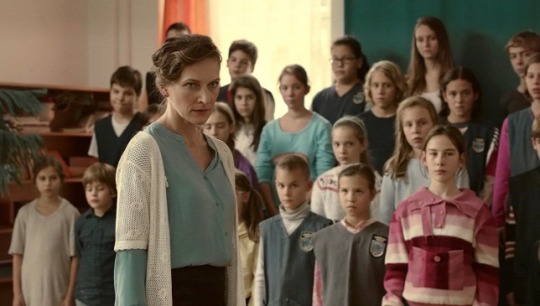


Mindenki
Innen is üdvözletemet küldöm Gizi néninek, Gyula bácsinak, és Marika néninek!
103 notes
·
View notes
Text
Alejandro Dolina y la importancia de soñar
“Los vendedores de elixir nos convidan todos los días a olvidar las penas y a mantener jubiloso el ánimo. El Pensamiento Oficial del Mundo ha decidido que una persona alegre es preferible a una triste”, denunciaba el polígrafo Manuel Mandeb, en las Instrucciones para abrir el paquete de jabón Sunlight (1).
Ahora bien, continuaba Mandeb (¿Mandeb-Dolina?), “la tristeza es la única actitud posible que los compradores de este jabón pueden adoptar ante un universo que no se les acomoda”. Y se refería entonces a la soledad, la angustia, el desencuentro y la injusticia.
Aunque la tristeza ha sufrido una injusta reputación, el que está triste “se ensimisma, piensa”. En cambio, dirá Mandeb, todos los artificios creados para producir alegría, por ejemplo los concursos de TV, “suspenden toda reflexión”. La tristeza, “hija y madre de la meditación”, encierra así -agregamos nosotros- un potencial disruptivo, cuestionador.
No es que Mandeb-Dolina rechace la alegría, pero sí cree que ésta es apenas un alivio pasajero, fugaz, en un universo esencialmente triste. “El universo se dibuja a sí mismo trazando imposibilidades (…) para intuir la tragedia de la condición humana hay que tener presentes las marcas que dejan las cadenas del tiempo, del espacio y de la lógica” (2). Estamos condenados a la muerte y a la pérdida de la juventud en el incesante devenir. En ese fluir, “la serie de sustituciones es tan vertiginosa que no tenemos tiempo de ser nadie”. (3). Todos somos Dorkas, personaje de las Crónicas del Angel Gris, víctima de un hechizo que lo condenó a caminar sin poder detenerse en ningún momento. Estamos condenados a la determinación (estar en un lugar es no estar en ningún otro) y al implacable reino de la causalidad.
Los personajes de Dolina, sin embargo, se sublevan frente a esta realidad y añoran vivir todas las vidas, estar en varios lugares al mismo tiempo, la juventud eterna, etc., aunque se trate de una batalla perdida de antemano. “Si nos espera el olvido, tratemos de no merecerlo”, dicen las Crónicas... (4). El arte y el amor aparecen como los dos titanes capaces de batirse contra las fuerzas de ese universo “fallado” al que siempre le falta algún detalle decisivo (el vino trae dolor de cabeza, la vida es hermosa pero uno se muere, etc.).
Y andan, sobre todo, a la busca de algún sentido para el universo, aunque sea uno siniestro. “Cualquiera que sea el mensaje que el cosmos prometa, por terrible y amenazador que nos pareciere, será mejor que la ausencia de mensaje. Será más consolador que una ominosa y absurda indiferencia de los astros” (5).
El mundo como es
Se trata, qué duda cabe, de un enfoque filosófico. En Dolina, los padecimientos de una sociedad de clases están relegados a un segundo plano. Las denuncias políticas ocupan un lugar secundario. Por eso, trata de invertir las acusaciones de divagación que pudieran formularse en su contra, señalando que “excepto la metafísica, todo es literatura de evasión” (6), es decir, todo aquello que nos distrae del problema central, que sería la muerte.
En la medida que en el horizonte están la parca y el olvido, los Hombres Sensibles de Flores (protagonistas de las Crónicas del Angel Gris) odian el futuro y la fe ingenua en el progreso que caracteriza a sus adversarios, los refutadores de leyendas.
Sin embargo, convengamos en que la inmortalidad es una fuente de paradojas. La eternidad asegura la perpetuación de un suplicio, como el de Prometeo, al que los buitres llegaban cada día “a cebarse en sus hígados negros”, según la expresión de Esquilo, en un tormento repetido hasta el infinito. Dicho en otros términos, pese a la amargura de la muerte y el paso del tiempo, quizás es preferible que todo lo que existe perezca. En el futuro está la muerte, es cierto, pero también el consuelo de que no hay mal que dure para siempre. Todo despotismo finalmente caerá y renovará las posibilidades de un mundo fraternal y sin opresión. El río herácliteo es un torrente impetuoso que barre con todo, incluyendo las penurias.
Algo de esto enseñaban las Afroditas de Flores, personajes de la novela Cartas Marcadas, cuando decían que “el goce es tal porque tiene fin. Sólo nos complace lo finito. Lo perpetuo es más adecuado para las condenas que para los disfrutes” (7).
Palabras finales
Frente a las penurias de la existencia, Dolina enfatiza la importancia de soñar. Los sueños y la lucha por concretarlos pueden terminar dotando de sentido a una vida que no lo tiene.
Pero es necesario que esos sueños tengan un anclaje en la realidad. La batalla por la realización de un sueño, o el esfuerzo en la realización escrupulosa de una fantasía, según las palabras de Lenin, puede hacer menos penoso nuestro paso por este valle de lágrimas.
NOTAS
(1) El libro del fantasma (Buenos Aires, Ediciones Colihue, 1999), pp. 19-21
(2) Cartas Marcadas (Buenos Aires, Planeta, 2012), p. 236
(3) Bar del Infierno (Buenos Aires, Planeta, 2006), p.302
(4) Crónicas del Angel Gris (Buenos Aires, Planeta, 2012), p. 97. La primera edición se publicó en 1988
(5) El Libro del Fantasma, p.73
(6) ídem, p. 20
(7) Cartas..., p.54
0 notes
Photo

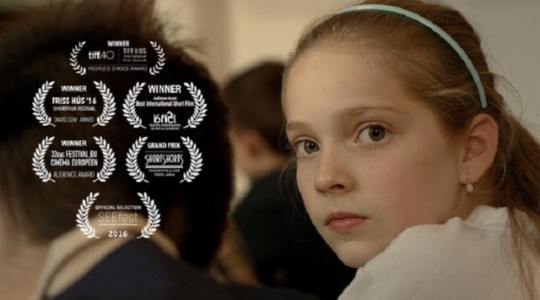

Hungarian short film ‘Sing’ (Mindenki) by Kristóf Deák has won an Academy Award in the category of Live Action Shorts, it was announced in Los Angeles on Sunday night. The 25-minute short film has become the first film directed by a Hungarian to secure a win in the category. Moreover, it is the second Hungarian film that earned the Academy Award in a year. The story of the film takes place in Budapest in 1991. According to the director, it is inspired by a true story, and “follows an award-winning school choir, their charming teacher and the new girl in class whose arrival starts a series of events that might expose the dark truth behind their fame.” The film stars two child-actors, Dorka Gáspárfalvi and Dorottya Hais, while the teacher is played by Zsófia Szamosi. Sing is only the second Hungarian live-action short film to receive an Oscar nomination; the first was 1963’s Concert, directed by István Szabó, who would go on to direct Mephisto, Hungary’s first Foreign Language Film Oscar winner. However, Sing has already had a great degree of international success before its nomination: the film won the Grand Prix prize at the Short Shorts Film Festival in Tokyo, the People’s Choice Award at the Toronto International Film Festival’s Kids category, and the Adult Jury Prize in the Live-action Short Film category at the Chicago International Children’s Film Festival. Sing’s success is an amazing recognition for the Hungarian film industry.
12 notes
·
View notes
Text
Sing Takes Home the Oscar for Best Live-Action Short Film
Sing Takes Home the Oscar for Best Live-Action Short Film #Oscars #SingShortFilm #Congrats #BestShortFilmLiveAction
We are so proud to announce that the winner of the Best Live-Action Short Film at tonight’s 2017 Academy Awards is Sing.
Sing | Dorottya Hais & Dorka Gasparfalvi
The heartfelt drama, Sing, is based on the true story of a young girl who is forced to either stand up against a corrupt system or fit quietly into it. Dealing with themes of ambition, rejection and solidarity, this powerful film was…
View On WordPress
#Academy Awards#Best Short Film#Dorka Gasparfalvi#Dorottya Hais#Kristof Deak#Live Action Short#oscars#short film#Sing#Zsofia Szamosi
0 notes
Audio
bátraké a nagyvilág, rájuk vár csak boldogság
#deák kristóf#mindenki#szamosi zsófia#gáspárfalvi dorka#hais dorottya#wolfgang amadeus mozart#mozart
0 notes
Photo



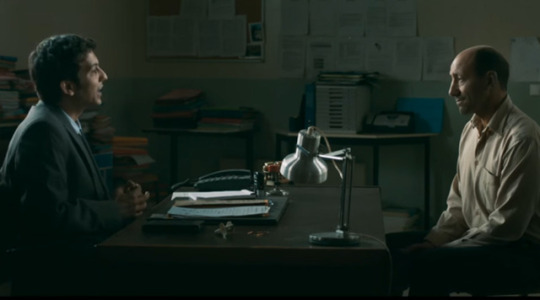

Best Live Action Short Film Nominees for the 89th Academy Awards (2017, listed in order of appearance in the shorts package)
Thankfully, this year’s nominees are not as heartbreaking as last year’s!
Sing (2016, Hungary)
Not to be confused with the obnoxious Illumination Entertainment animated film of the same name, Sing (released alternatively with its original Hungarian title, Mindenki) is directed, co-produced, and written by Kristóf Deák, and it, too, has something to do with singing and a musical competition. It is 1991, and young Zsófi (Dorka Gáspárfalvi) has moved with her family to Budapest and is looking at her new elementary school. Upon her first visit, she admires how beautifully the school’s choir – directed by Miss Erika (Zsófia Szamosi) – sounds. Zsófi joins the choir, but, because of her limited singing ability, Miss Erika instructs her to mime along to the lyrics during rehearsal and the performances. Heartbroken, Zsófi, confides with her new friend Liza (Dorottya Hais) about Miss Erika’s words, and Liza – armed with Miss Erika’s secret – must decide whether to voice her dissent or not.
The resolution – or, punchline, if you prefer – to Deák’s film is predictable as it comments on an adult’s pursuit of glittering glories rather than developing the musical and personal strengths of the children she attends to. The child performances are a highlight (there always seems to be at least one short in this category every year surrounding children being children) as well. As a film built upon a simple concept – which apparently was based on a story Deák heard from a Swedish friend – Sing is the sort of narrative that fits perfectly within the confines of a short film. It isn’t revelatory, but it extracts what it can from its charming premise.
My rating: 7.5/10
Silent Nights (2016, Denmark)
The European migrant crisis is the subject of two of the Best Documentary Short Film nominees this year, and they have a companion piece in Aske Bang’s Silent Nights. Homeless shelter worker Inger (Malene Beltoft) has a few run-ins with Kwame (Prince Yaw Appiah, who has never acted before), a Ghanaian migrant who is a regular there. The two strike up a romance prior to the Yuletide, to the dismay of Inger’s alcoholic, racially resentful mother (Vibeke Hastrup), but Inger will learn in the New Year that Kwame is not all he says he is.
By some margin, Silent Nights – alternating in English, Danish, and what I’m assuming is an indigenous Ghanaian language – is the weakest of the nominees here as it is an organizational shambles. The Inger-Kwame romance feels too rushed, and the gendered messages of the film are muddled when Kwame makes certain decisions that venture into murky, exploitative ethical waters. As well-meaning as Silent Nights is trying to be and as adequate the two actors’s performances are, its half-hour runtime prevents Bang’s screenplay from justifying any of its central characters’ otherwise inexplicable behaviors. The groundwork for a feature film is there – and of its fellow nominees this year, I think Silent Nights would work best in an expanded format – but its editing and narrative structure are so harried that it is difficult to know how to feel about its protagonists once the credits roll.
My rating: 6/10
Timecode (2016, Spain)
Juanjo Giménez’s Timecode received the Short Film Palme d’Or – if you are a dedicated cinephile... admit it, you didn’t know the Short Film Palme d’Or existed either – at the 2016 Cannes Film Festival. With fifteen minutes to spare and with sparse dialogue, it is an oddity of a short film. After twelve-hour shifts at a residential parking garage, Luna (Lali Ayguadé) replaces Diego (Nicolas Ricchini) once his night shift has completed. They watch the security cameras for disturbances; nothing ever happens until some strange evening, of course. As I think it is best to see Timecode as unspoiled as possible to the plot, it should be noted that there is some excellent dancing in here to break that monotony as well as a final line that arguably might be the best final line in any film released last calendar year.
But even at fifteen minutes, Timecode feels longer than it probably should be. Repetitious cinematography and editing becomes bothersome even by the halfway mark, and Timecode never garners enough dynamism and momentum that its incredible final minutes should have. The payoff has meager development prior to the finale. At least Giménez had the wisdom to conclude his short film earlier rather than provide an unnecessary epilogue, as Timecode comes dangerously close to wearing out its foundations even before the uplifting final minutes.
My rating: 7/10
Ennemis intérieurs (2016, France)
Also known by its English title, Enemies Within, Sélim Azzazi’s (a sound editor who has never directed a film before) work startles with its timeliness. France, which never lifted its state of emergency – continuing to engage in warrantless searches and seizures – since the November 2015 Paris attacks, is a nation on numerous sociopolitical fronts in global politics. Enemies Within, which damns institutional Islamophobia, is also a reminder of how France (and most of Western Europe) has ostracized non-white immigrants from society. Here, an interrogator (Najib Oudghiri, who is white-passing) is questioning an unnamed Algerian-born Frenchman (Hassam Ghancy) about basic citizenship questions. But this isn’t a citizenship application appointment; it is an investigation into suspicions of terrorist links. The line of questioning escalates about the suspect’s ties to the Armed Islamic Group of Algeria, becoming increasingly uncomfortable for Ghancy’s character and viewers alike.
Two brilliant central performances enliven a film that almost entirely takes place in a single, poorly-lit room. Patient camerawork and a willingness to let the sharp dialogue be the film’s star breathe believability in an otherwise anonymous encounter. How easily, Azzazi’s film notes, that our innocuous civilian lives can be interpreted, twisted into a tale that can be used as fuel for paranoia and prejudice. This interrogation, characterized by precarious irony and moral conundrums without correct answers, allows us to imagine what such treatment must be like to those who worship a certain way, who believe in something seen to be at odds by the person sitting just across a table.
My rating: 8.5/10
La Femme et le TGV (2016, Switzerland)
Also known as The Woman and the TGV or The Railroad Lady, Timo von Gunten’s work stars Jane Birkin (1966′s Blow-Up and 1978′s Death on the Nile) in what is purported to be her final film. The widowed Elise (Birkin) has nothing but her pet bird as company and her relationship with the outside world can best be described as antediluvian. Every morning, she waves her Swiss flag at the passing TGV train (a tradition she once shared with her now-grown son) and cycles her way into town to open up her bakery – which has had fewer customers since the opening of a multinational, cheaper bakery down the street. One day, the driver of the TGV starts a correspondence with Elise and they exchange stories and goodies (she provides baked goods; he gifts her cheese). But change is in the air, and this final vestige of constancy will soon be no more.
La Femme et le TGV meditates on the passage of time, of how difficult it is for some of us to realize that the things that once made us most comfortable must pass. There is a brow-to-brow smiling whimsy about von Gunten’s film that allows it to be greater than the sum of its parts. A superb final performance from Birkin and her interactions with her co-stars make the film – we see how insecure and uncertain Elise is in facing the unknown. But a rushed conclusion disservices character developments as things fall into place too simply for Elise. Nevertheless, La Femme et le TGV is a delightful thirty minutes never overstaying its welcome, as Elise will find a way to find community, friendship close to home.
My rating: 8/10
^ Based on my personal imdb ratings. Half-points are always rounded down.
This is the third write-up for 2017′s 31 Days of Oscar.
#Silent Nights#Timecode#Ennemis intérieurs#La Femme et le TGV#Oscars#Sing#Kristóf Deák#Aske Bang#Juanjo Giménez Peña#Sélim Azzazi#Timo von Gunten#31 Days of Oscar#My Movie Odyssey
1 note
·
View note
Text
TABITA (DORKAS)
Saat Teduh……………
01. Nyanyian KJ. No.4:1. “Hai Mari sembah” Hai mari sembah Yang Maha besar, Nyanyikan syukur dengan bergemar Perisai umatNya, Yang Maha esa, Mulia namaNya, takhtaNya megah.
02. Pembacaan Firman Pagi : Matius 17:24-27. Malam : Amsal 3:1-12.
03. Renungan: Kisah Para Rasul 9:36. Di Yope ada seorang murid perempuan bernama Tabita – dalam bahasa Yunani Dorkas. Perempuan itu banyak…
View On WordPress
0 notes
Link
BEST LIVE ACTION SHORT: – ENNEMIS INTERIURS (ENEMIES WITHIN) What starts out as a straight forward interview becomes an intense interrogation in this scathing, political thriller. Set in the 90’s, the film also looks at France’s turbulent relationship with Algiers. As the film begins, An Algerian teacher (Hassan Ghancy) applies for French Citizenship. He answers a series of basic questions of France’s Culture to an officer (Najib Oudghiri). But as the interview progresses, questions start to lean toward a terrorist attack by two Algerians. The officer suspects those two were at the same mosque meeting the teacher was at. The interrogation grows more hostile as the officer tries to get the teacher to name names. The premise probably has the simplest delivery of the films in this category. Most of the film is just these two character in a single room, talking. And yet it’s the most gripping short in this category. Starting with a simple Q & A, writer/director Selim Azzazi builds a slow burn of suspense coming out of each information revealed. The teacher also reveals himself to be a complex protagonist. Though born in the Algiers, he considers himself first and foremost a French man. He argues that since Algiers was part of the French Empire when he was born, he is therefore a Frenchman. But his fate lies in the hands of a man who could deport him with just the click of his pen. And no one will let him leave without two names. You don’t know much about him, but thanks to Ghancy’s performance, you care for him and don’t believe he had anything to do with this. This film takes a simple premise and keeps you in suspense. When it’s over, you’ll have a lot to talk about with your friends. – LA FEMME ET LE TGV The most romantic short in this category, this adorable little gem from Switzerland follows the developing relationship of two people who never meet. Every day, the TGV passes a little house of Elise (Jane Birkin), whose always there to wave her Swiss Flag. This seems to be the only high point of her day. Once a successful business, Elise’s bakery now struggles with competition from the All Deal retail store. Not helping is this ballet blaring techno tunes right next door. Her son Pierre (Mathieu Bisson) has grown up and moved out. Her only companion is Balthazar the budgie. So, the only excitement of her day is the coming of the TGV. Then one day, a letter comes flying onto out of the train and onto her lawn. So, begins a loving correspondence between Elise and the mysterious train conductor named Bruno. Elise would send letters and her treats to Bruno, who throws his letters out the window, along with some cheese. But their romantic correspondence comes under threat when the train takes a different route. La Femme Et Le TGV reminds me a lot of 84 Charing Cross Road, a biopic about two bookdealers (Anne Bancroft and Anthony Hopkins) who formed a bond through business correspondence. Both films are romances centered around two people who never meet. You’d think this would be the kiss of death for romance films, and yet both films seem to make it work. Romance live and die by the chemistry between the two leads. How can you have chemistry when the two leads never have a scene together? With great writing, that’s how. Elise and Bruno bring out their most romantic sides in their letters, often turning to each other to vent their personal problems. Though it begs the question; are they falling for each other’s true selves or just idealized versions of each other? What also makes it work is Birkin’s performance. She creates such a quirky character in Elise that she brings joy in every minute she’s on screen. When she waves her swiss flag, she brings out her character’s genuine happiness. Plus, she faces the task of selling the questionable decision of falling for a person she hasn’t met. Her romance feels so genuine that you can’t help but root for her to get together with Bruno. She also as good in her low points, especially when Pierre gives his mom a degrading birthday present. The film is also very funny. Elsie cherishes Bruno’s gifts of cheese. There’s just one problem; she hates cheese. So, we are treated to the hilarious image of a fridge full of cheese. La Femme et Le Tiv will leave audiences swooning over this romance. – SILENT NIGHTS All the way from Denmark comes a love story about two people fallen on hard times. Kwame (Prince Yaw Appliah) immigrated from Ghana in hopes of providing more for his wife and kids. Instead, He finds himself on living on the street, making a living by collecting bottles. Meanwhile, Social worker Inger (Malene Beltoft) cares for her deadbeat, drunken mother Solveig (Vibeke Hastrup), who makes her life a living hell. These two lost souls come into each other lives when Kwame’s beaten by some racist thugs and Inger comes to his aid. After nursing him to health, they sleep with each other. They seem like a great couple, if it weren’t for a few problems. First, Solveig is gets very racist when she’s drunk, which leads to an awkward first meeting. Second, there’s both living in states of extreme poverty. Oh, and there’s the matter of Kwame’s wife and kids in Ghana. The film seems to draw inspiration from Rainer Werner Fassbinder’s romantic masterpiece Ali: Fear Eats the Soul. Both films focus on the relationship between a lonely woman and an immigrant and the prejudices inflicted upon them. While not as frequent as in the later film, Silent Nights still has Kwame dealing with racial hostility, as previous beatings indicate. In an interesting spin, the hostility doesn’t only come from Caucasians. In fact, the thugs are of Danish born Arabs. I assume writer/director Aske Bang’s trying to prove whites aren’t the only ones’ hostile towards refugees. The film is clearly a commentary on the Syrian refugee crisis. What is surprising is how complicated the film portrays Kwame. The man came to Denmark thinking it would give him a better chance to provide for his family, only to find himself under a tunnel in the freezing cold, at least when the shelter’s not full. Fearing shame, Kwame can’t bring himself to return home without anything to show for it. On one hand, we can sympathize with his circumstances. But then Bang tests our sympathies by having him commit criminal activities. Kwame’s need for funds becomes urgent when his daughter contracts malaria. In his desperation, he commits a horrible act that’s not only criminal, but also nearly destroys his relationship with Inger. Sure, you understand why he did it, but it’s still a horrible thing to do. And then there’s the fact he’s cheating on his wife and doesn’t even have the decency to tell Inger, which may prove unforgivable for some audience members. We probably wouldn’t feel any sympathy if it weren’t for Appliah, who brings a lot of heart into his performance. The film has a lot of ups and downs. The films’ highpoint is the opening scene, which intertwines Kwame’s and Inger’s troubled lives with a church choir’s beautiful rendition of “Silent Night.” The low point is the ending. The message it sends is just…confusing. Whether the high points outweigh the low points is up to the audience. – SING (MINDEKI) Not to be confused with Illumination’s recent animated film, Sing is a Hungarian import. Moving to a new school is never easy for a kid. Despite the butterflies in her stomach, Zsofi (Dorka Gasparfalvi) fits right into her new environment, even joining her new best friend Liza (Dorka Hais) in the schools’ award winning choir class. After the first rehearsal, Zsofi comes to see why choir director Ms. Erika (Zsofia Szamosi) is her favorite teacher. But then Ms. Erika pulls her aside and insists Zsofi lip synch for the rest of rehearsals, which drains the poor girl of her enthusiasm. Soon, the girls come to realize how unfair adults can be. While a lesser actress would have hammed it up as Ms. Erika, Szamosi delivers a more nuanced realism to the character. When we first meet this teacher, she seems like a nice, encouraging teacher. When she does put down Psofi’s singing, she twists her insults under a polite guise; “You can sing in your head.” Szamosi maintains her polite manner as Ms. Erika tries to rationalize her questionable treatment of some students. It takes a hard push for her to show her true colours, but even then, she tries to mind her manners. Through Ms. Erika, the girls can see how adults make excuses for bad behavior, always believing themselves to be in the right. Matching her performance as the girls. Whenever they are together, Gasparfalvi and Hais make the interactions between Zsofi and Liza feel like real life conversations between two girls. Gasparfalvi is so joyful in the early scenes that when Zsofi’s spirit is broken, it’s upsetting. These little actresses further the depth of their character’s relationships when Zsofi won’t tell the concerned Liza why she’s upset. When they gather the choir team to get back at Ms. Erika, their hilarious revenge is glorious. SPOILER ALERT: These elements come together thanks to Director/Co-writer Kristof Deak. But one scene proves he has excellent storytelling skills. During one choir rehearsal, Liza starts to grow suspicious. She looks to student after student, and comes to realize Zsofi isn’t the only one who’s lip synching. The irony is the choir’s song is about singing in defiance. The fact he pulls this off without any spoken dialogue takes a master storyteller. – TIMECODE We conclude with the Palme D’or winning at the Cannes Film Festival. Today seemed like any other day for security guard Luna (Lali Ayguade) until she got a call from her boss. Apparently, a client’s tail lights were knocked out and the boss wants her to check the video. After typing in the timecode, the video reveals fellow guard Diego (Nicolas Ricchini) was dancing across the parking lot and accidently kicked out the light. Instead of ratting him out, Luna decides to try her hand at it. On her shift, she awkwardly dances in front of the security cameras and leaves a note of the times for Diego to watch it. Diego plays along, leaving notes for her to watch his dancing. This exchange starts a funny bond between these two. This is the third short film in this category centred around a blooming romance. The question is does this even count as a romance or just two friend enjoying a common activity? Either way, this short film is very funny, especially in the way it ends. Who Will Win? The odds are in favour of Ennemis Interieurs. This film is probably the best written and best acted film on the list, bringing a complex discussion of immigration and terrorism under a deceptively simple guise of a political thriller.
#best live action short film#2017 academy awards#2017 academy award nominations#academy award nominee#academy award nominations#academy awards#random richards review#random richards#ennemis interieurs#selim azzazi#la femme et Le TGV#timo Von Gunten#giacun Caduff#silent nights#Kristof Deak#Anna Udvardy#timecode#Juanjo Gimenez#Hassam Ghancy#Najib Oudghiri#Pere Altimira#Lali Ayguade#nicolas ricchini#Vincente Gil#Pep Domenech#Marlene Beltoft#Prince Yaw Appiah#Vibeke Hastrup#ali kazim#refugees
1 note
·
View note
Photo
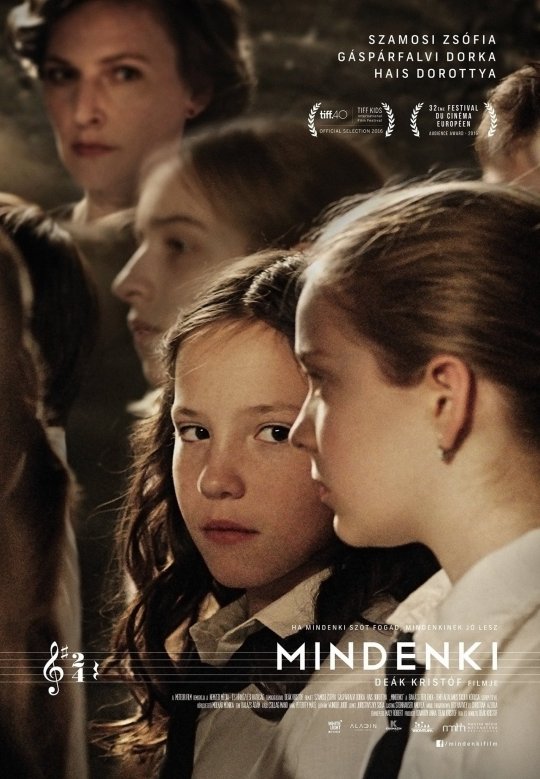
Hajrá MINDENKI!!!
#mindenki#deák kristóf#gáspárfalvi dorka#hais dorottya#szamosi zsófia#oscar#best live action short film
14 notes
·
View notes
Quote
Az egyik 14, a másik még csak 13 éves, de máris egy Oscar-jelölt film főszereplőiként utazhatnak jövő héten a Los Angeles-i díjkiosztóra. A Mindenki című kisfilm gyerekszereplőivel ültünk le beszélgetni, Gáspárfalvi Dorkával és Hais Dorottyával, akiket már megismernek az utcán, és a filmjüket erkölcstanórán mutogatják a sulikban. Hatévesen kezdték a szakmát, azóta mindketten reklámoztak kekszet Antonio Banderasszal, forgattak Helen Mirrennel és Mr. Beannel, elvégezték a kaszkadőriskolát, szinkronizálnak, és mindennap hajnali ötkor kelnek. Szívesen lennének Magyarország miniszterelnöke, de csakis együtt. Ismerjen meg két elképesztő kislányt!
Tele volt a fejünkkel a híradó
0 notes
Text
„Úgy kezeltek minket, mint bármelyik nagy világsztárt”
– Nagyon izgalmas, felemelő, minden várakozást felülmúló érzés volt megkapni az Oscar-díjat a Mindenkiért – kommentálták lapunknak stábtagok a hétfő hajnali elismerést. Amerikai idő szerint hajnali fél ötkor értük el Maly Róbert operatőrt, illetve a vele egy helyen tartózkodó Csillag Manó vágót. Mint mondták, Deák Kristóf rendező már ki is dőlt a hosszú nap után, ők viszont azóta is ébren voltak, fogadták a gratulációkat, sőt elmondásuk szerint már izgalmas egyeztetéseken is túl van a stáb.
Maly elmondta, a további sugárzásról, jövőbeli lehetőségekről folytak tárgyalások, több ígéret is elhangzott, bár még semmi konkrétat nem lehet tudni, „ez nagyon távolinak tűnik most” – mondta. – Felkérés még nem hangzott el, de nagyon reménykeltő az egész – tette hozzá.
Gáspárfalvi Dorka: Mintha csak egy meséből jöttünk volna
Elértük az egyik főszereplő lányt, Zsófit alakító Gáspárfalvi Dorkát is. Lapunknak beszámolt róla: azok után, hogy kimehettek Los Angelesbe, nem számítottak még arra is, hogy a legvégső pontig jutnak, és Oscar-díjjal térhetnek haza. „Nekünk az is öröm volt, hogy láthattuk Kaliforniát, és az út maga is ajándék volt, hiszen még Grönlandot is érintettük. A sziklás hegységtől egyenesen ámulatba estem” – jegyezte meg. Hatalmas élménynek látta azt is, hogy végre a „hideg, de varázslatosan szép” óceánba gázolhatott, „maga a csoda volt, hogy a részesévé válhattunk az eseményeknek”. Többről már nem is mertek álmodni, mint az út végén a 150 méter hosszú vörös szőnyegre lépni, „ahol úgy kezeltek minket, mint bármelyik nagy világsztárt”.
Hais Dorottya, Gáspárfalvi Dorka és Szamosi Zsófia főszereplők, Udvardy Anna producer, Deák Kristóf rendező és Balázs Ádám zeneszerző az Oscar-gála vörös szőnyegén Facebook
Dorka szerint az elismerés Deák Kristófnak szól, és óriási öröm volt számára hozzájárulni, hogy a film idáig eljusson. A díjkiosztó világát hihetetlennek tartotta, mintha csak egy meséből jött volna, de elvarázsolták a „ruhaköltemények” és a hangulat is. Még azt is megkérdezte magától, vajon megérdemelte-e, hogy mindezt átélhesse. – Nagyon sok ember sokkal idősebb korában is csak vágyakozik erre, és álom marad számára – mondta.
A kategória jelöltjeivel is jó hangulatban beszélgettek
– A Filmművészeti és Filmtudományi Akadémia elnöke is szárnyai alá vette a készítőket, körbevezette, bemutatta őket – mondta lapunknak Csillag Manó vágó. Szerinte is minden várakozást felülmúló a siker. – Ez már az a szint volt amúgy is, amikor nincsenek várakozások. Amíg a kategória jelöltjei nem jöttek, nem is volt akkora őrületes izgatottság, csak a nomináltak sorsolásának kezdésénél indult meg a remegés, a feszült lábdobogás – tette hozzá.
Csillag szerint rendkívül jó volt a fogadtatás, egy jól szervezett, hatalmas gépezet működését látták. Mint mondta, sokszor elhangzott, hogy a filmes közösség nem ismer határokat, és ez látszott azon is, mennyien örültek a sikernek, sőt a kategória többi jelöltjével is jó hangulatban beszéltek, gratuláltak, ahogy ők is tették volna, ha másé lett volna a szobrocska.
A legjobb élőszereplős rövidfilm kategóriában jelölték még a kanadai Ennemis Intérieurs, a svájci La Femme et le TGV, a dán Silent Nights és a spanyol Timecode című filmeket.
Indulhatnak az amerikai vetítések
– A számolás joga egyik főszereplőnője, Janelle Monáe is gratulált az elismeréshez – tette hozzá Csillag. (A számolás jogát jelölték a legjobb film, legjobb adaptált forgatókönyv és a legjobb női mellékszereplő kategóriákban, de ezeket végül nem váltotta díjra.) Sokan mondták, hogy látták is, de a film karrierje igazán most indulhat be az Egyesült Államokban, mozikban is indulnak a vetítések, és bár nem akarja elkiabálni, de a vágó szerint akár a legnézettebb magyar film is lehet most majd kinn a Mindenki.
Az Oscar-díjkiosztót itt olvashatják el, itt pedig arról számoltunk be, hogy az érdeklődők most is végignézhetik az immár arany szobrocskával is elismert rövidfilmet.
„Úgy kezeltek minket, mint bármelyik nagy világsztárt” a Nemzeti.net-en jelent meg,
0 notes
Text
http://www.napimagazin.hu/ujabb-magyar-siker-oscar-dijas-lett-deak-kristof-rovidfilmje/
New Post has been published on http://www.napimagazin.hu/ujabb-magyar-siker-oscar-dijas-lett-deak-kristof-rovidfilmje/
Újabb magyar siker: Oscar-díjas lett Deák Kristóf rövidfilmje
Deák Kristóf rendező és Udvardy Anna producer kapta a Mindenki című alkotásért a legjobb rövidfilmnek járó díjat a 89. Oscar-gálán helyi idő szerint vasárnap este Los Angelesben.
A Mindenki az első magyar kisfilm, amely elnyerte az amerikai filmakadémia díját. A hollywoodi gálán résztvevő alkotói csapatnak a filmben nagy szerepet játszó Bakáts téri Ének-Zenei Általános Iskola kórusa is szurkolt Budapesten. A gyerekek és a tanárok az iskola épületében kísérték figyelemmel az Oscar-díjátadót és ünnepelték a győzelmet.
fotó: AFP
Deák Kristóf a díjat átvéve köszönetet mondott a filmakadémiának, valamint családjának és tanárainak. “Ajánlom ezt a díjat mindazoknak az embereknek, akik jobbá tehetik ezt a világot, a gyerekeknek. Próbáljuk őket jól felnevelni, hogy büszkék lehessünk rájuk” – fogalmazott.
A Mindenki (angol címén Sing) a kilencvenes évek elején, iskolai környezetben játszódik, központi eleme egy rossz pedagógiai modell, egy gátlástalan tanárnő sikerhajhászása, amelyre a film gyerekszereplői adnak csattanós választ.
Az összefogás erejéről szóló 25 perces film főszereplői Gáspárfalvi Dorka, Hais Dorottya és Szamosi Zsófia, továbbá a rendező mellett Udvardy Anna producer és Csillag Mano vágó is részt vett a Los Angeles-i Dolby Színházban megrendezett Oscar-díjátadón.
“Egy emberként ugrottunk fel, iszonyatosan örülünk a díjnak, nagyon büszkék vagyunk rá” – mondta Csillag Mano vágó a Duna televízió élő közvetítésében. Elmesélte, hogy a tervek szerint a stáb együtt ünnepel a gála után, részt vesznek a kormányzói bálon, és meghívást kaptak az egyik legfontosabb afterpartira, Elton John ünnepségére, amelyet a sztár az Oscar-nyertesek számára rendez minden évben. “Egy napunk marad, hogy feldolgozzuk az örömöt, és utazunk vissza Magyarországra” – fűzte hozzá.
“Mélyebb történetről van szó, minthogy gyerekfilmnek tekintsük. Már a jelöléssel elindult az érdeklődés a nagy stúdióktól is” – mondta.
A NMHH Médiatanácsa Magyar Média Mecenatúra programjának támogatásával készült Mindenki univerzális témát tárgyal, a nemzetközi filmfesztiválok közönsége is közel érezte magához a történetet. “Viszonylag szívhez szóló, befogadható téma, de közben azért vannak olyan rétegei, amiken el is lehet gondolkodni” – mondta korábban az MTI-nek a rendező.
0 notes
Text
A néma tátogás pátosza
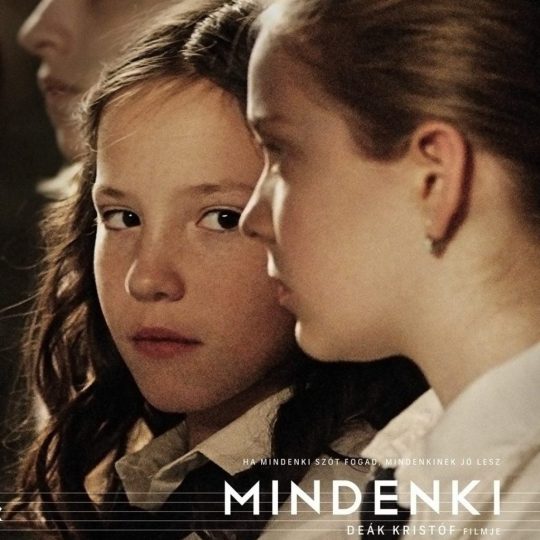
1991-ben, a rendszerváltás utáni Magyarországon járunk, a világban, ahol a komplex paradigmaváltás még nem fogott táptalajt a fejlődéshez. Ide érkezik meg - mintegy szimbolikus utazóként - a 10 éves Zsófi (Gáspárfalvi Dorka), akinek az új közegben minden(ki) teljesen steril és idegen.
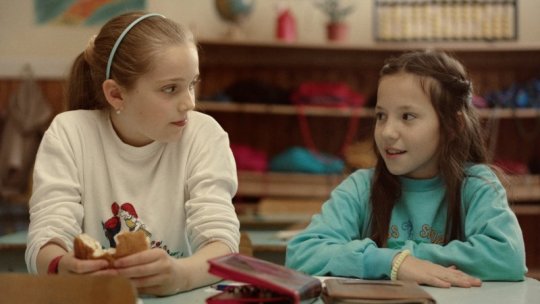
A változás természetesen meghozza a gyümölcsét, ugyanis az osztály legnépszerűbb kislánya, Liza (Hais Dorottya) lesz az új barátnője, aki pártfogásba veszi az új jövevényt, hogy biztosítsa: jó rendsz..., akarom mondani, osztály ez. Ugyanis mindketten bekerülnek a messze földön híres kórusba, ahol az első próbák után lehull a lepel:
a tökéletesnek hitt rendszernek egy sikeréhes vezető, a kórustanár Erika néni (Szamosi Zsófia) a vízfeje.
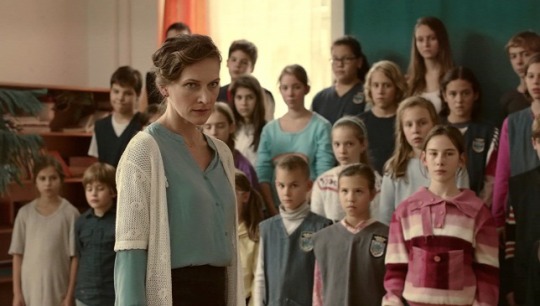
Az elitválogatott(nak mutatott) kórusba látszólag ugyan mindenki bekerülhet - hisz ez a rendszer, na kórus, kikúrt jó -, énekelni viszont csak a kiváltságosoknak szabad - naná, mindent a sikerért, ugye. Lehet ingyér utazni Skandináviába, ez a díj ugyanis a nyertesnek, aki nem lehet más, mint Erika néni. Ja és az osztálya.
Zsófi hogy-hogy nem, de abba a kalapba kerül, akiknek a kussban tátogás művészete marad, ami, nem kell mondanom, a kislány számára lelki katasztrófát okoz - teljes joggal. Liza azonban megérkezik a rövidfilmbe, régi társként áll ki új barátnője mellett, s olyan tervet eszel ki, amelytől még az Akadémián is betojnak, így sebtében az Oscar-t is odaadják Deák Kristóf filmjének.
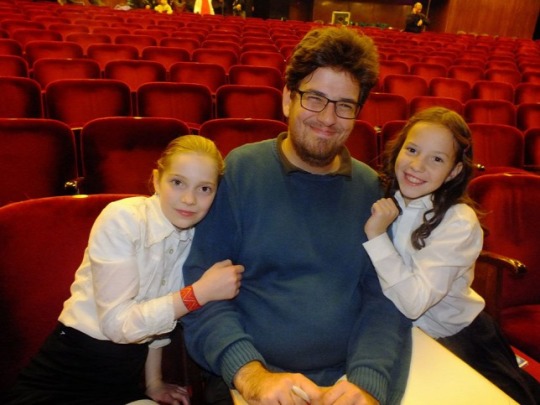
Kíváncsiak vagyunk az ötletre, ugye?
A hőn áhított versenyen aztán bekövetkezik amire a vízfejű vezetés nem gondolt. A valamibe és a semmibe nézett gyerekek, a rendszer építő elemei, összefognak, s erős közösségként mennek szembe a tanárnő sikerorientált akaratával, miszerint csak az énekeljen, aki tud is. Na igen, csak a gyerek sem teljesen idióta, szükségben ismerszik meg a barát, mondják, így ők is húznak egy lapot:
csak együtt képesek kinyilvánítani akaratukat, amiért tenni is hajlandók.
Mindenki egyért, egy mindenkiért, vagy hogy mondják a közhelymantrázók. Szóval senki sem énekel. Tancinéni meg mérgében kirohan a rendsz..., a világból.
Im-ígyen lesz a Mindenki Oscar-díjas momentuma a néma tátogás pátoszi pillanata.
Egybetumeter: 10/8
PORT
http://port.hu/adatlap/film/mozi/mindenki-mindenki/movie-172821
“Rövidített trailer”
https://www.youtube.com/watch?v=SYhizGmCK7g
0 notes